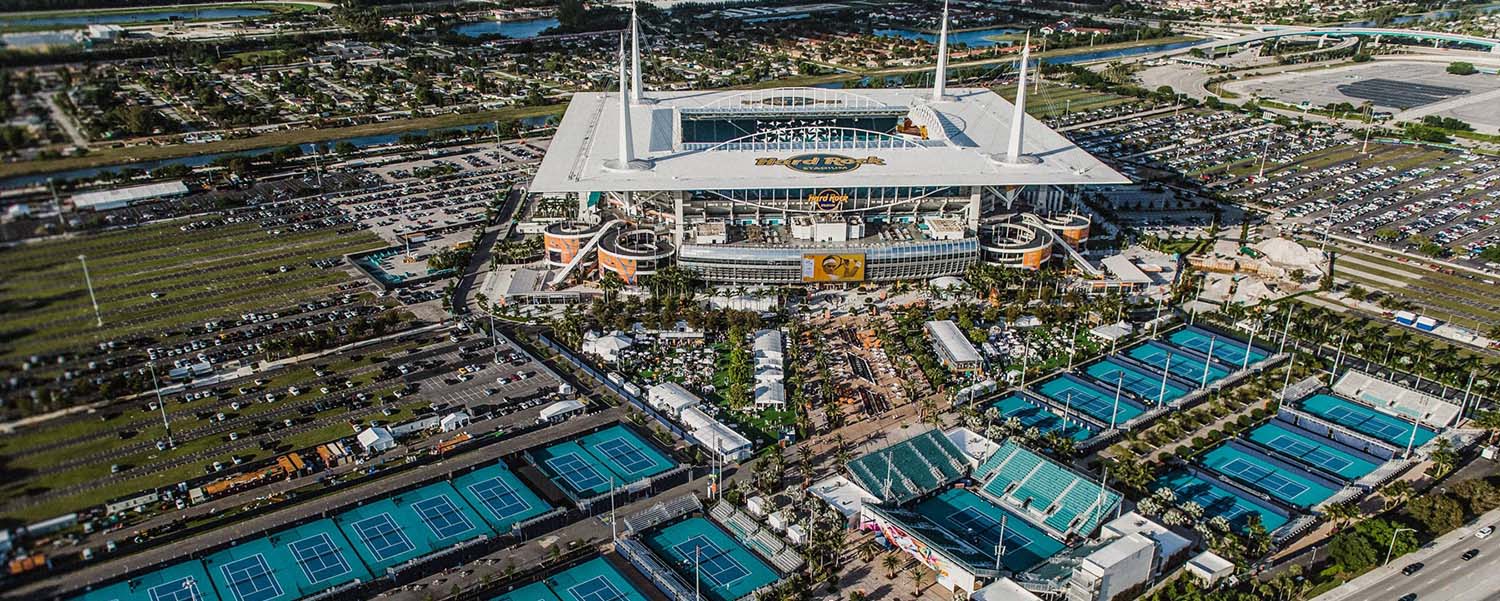Hard Rock Stadium

On Sunday, September 20, 2020, Hard Rock Stadium, home of the Miami Dolphins, allowed 13,000 Dolphins fans to their home opener game against the Buffalo Bills, accounting for 20 percent of capacity at the 65,000-seat stadium.
It sparked a promising start to the football season at the Hard Rock Stadium.
With more games and other events to come, it is good to know that the health and safety of the fans, players, coaches, and personnel are a top priority to the staff at Hard Rock Stadium.
What made this facility what it is today?
Hard Rock Stadium
Hard Rock Stadium was built by Joe Robbie and opened in 1987. It has hosted some of the biggest events in the last 30 years including college football national championship games, Super Bowls, Orange Bowls, and World Series. It went through a $550 million renovation in 2014-2016, which was privately funded by Stephen Ross, managing general partner of both the Miami Dolphins and Hard Rock Stadium.
Since that time, it has hosted the El Clásico soccer match in July 2017, which was the highest-grossing soccer event in North American history. Also, Super Bowl LIV was played at this stadium just this past year on February 2, 2020. Other past events include many Miami Dolphins’ games, the Miami Open tennis tournament, University of Miami football games, and Orange Bowls.
According to Miami Dolphins and Hard Rock Stadium Vice Chairman and CEO Tom Garfinkel, they hope to host the 2021 College Football Playoff National Championship game and the 2026 FIFA World Cup. “We are also working on finalizing a plan to bring a Formula One race here to Hard Rock Stadium.”
The ‘backfield’ personnel
This group would be the stadium’s team of employees. The stadium prides itself on attracting the very best employees, including younger workers.
Like a proud coach, Garfinkel claims: “We’ve built a culture that celebrates innovation and creativity, and one that values ideas no matter where they come from. It’s definitely a meritocracy. I like to call it a results-based culture with heart. We have high standards and care about people and their development at the same time.
“I believe that your reputation in the industry determines whether or not you become a place where talented people want to come work. So, these cultural ideals have to be genuine.” Garfinkel continues, “The last three ticket sales leadership jobs in the industry were filled by our employees. Some people would think that means we are losing talent; but on the contrary, to me, that means that we develop leaders and help to grow people’s careers, and that younger talent here can grow into leadership roles. This means we have become a place where people know we will support their personal and professional growth–and that attracts talent.”
An ‘offensive line’
This talented hardworking group huddled and then formed an aggressive offense to fight the recent pandemic affecting this American pastime. Stadiums and sports venues everywhere are looking for ways to recover from the pandemic.
“I think cleanliness was an aesthetic challenge in the past,” says Garfinkel. “Moving forward, it’s much more about health and safety.” Cleanliness now is as expected as having electricity or running water.
“What we are trying to do is lead the industry by using the GBAC® STAR accreditation and protocols as a guide to making sure we aren’t just practicing hygiene theater but are actually removing pathogens and making the environment as safe as it can be,” claims Garfinkel.
ISSA and GBAC® STAR
As a member of ISSA, Hard Rock Stadium had a plan in mind. They wanted a credible expert third-party endorsement so that they weren’t creating their own, uninformed standard of cleanliness. During the off-season, this facility became the first NFL stadium to earn GBAC® STAR accreditation.
The gold standard of facilities, GBAC® STAR provides third-party validation that the stadium is establishing and maintaining a thorough cleaning, disinfection, and infectious disease prevention program designed to minimize risk associated with infectious agents such as SARS-CoV-2 (responsible for COVID-19) for employees, guests, the community, and the environment.
Garfinkel continues, “We’re proud to be the first facility to receive the GBAC-STAR rating and believe it makes us safer and gives our employees and customers more confidence.”
Garfinkel’s advice to other facilities and peers: “First, understand your market and focus on innovating the guest experience. Secondly, as a member of ISSA, use the resources available to you and communicate what you are doing to engender more confidence from your guests that you are doing everything you can to keep them safe.”
Look into receiving a GBAC® STAR accreditation for your facility. It will put you in line for a “touchdown.”
















